About Toyo University Progress:Fumiya Matsui(4th year student, Department of Electrical, Electronic and Communications Engineering, Faculty of Science and Engineering)
At Toyo University, many students demonstrate their outstanding talents in a wide range of fields, including scholarly and scientific research, sports, and volunteer activities.
We interviewed Fumiya Matsui, who won the Best Student Presentation Award at an international conference where students can present their research activities.
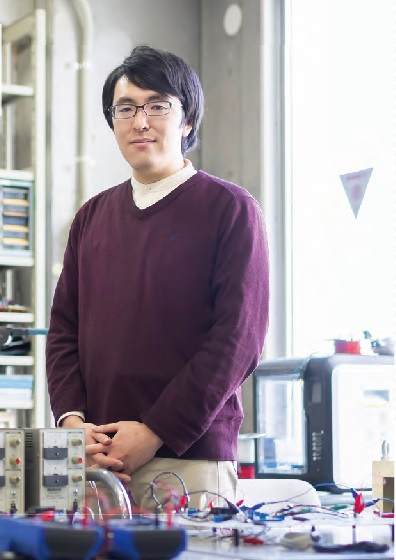
4th year student, Department of Electrical, Electronic and Communications Engineering, Faculty of Science and Engineering
Fumiya Matsui
Matsui is researching signal processing ICs (integrated circuits) and analog circuits at the laboratory office of Professor Yuji Sano, Department of Electrical, Electronic and Communications Engineering, Faculty of Science and Engineering. Awarded the Best Student Presentation Award at the TJCAS2021*, the international conference hosted by the IEEE for his presentation regarding the performance of a prototype he designed.
*2021 Taiwan and Japan Conference on Circuits and Systems
Cherishing my passion since childhood led me to take up the path of a researcher.
I have liked science and math since I was a child. When I was an elementary school student, I visited the school festival of an engineering university in my home prefecture of Niigata. When I saw the soundproof room and experiments about the wavelength of light, this sparked my interest in pursuing a career in science. Currently, I am researching signal processing ICs (integrated circuits) at the laboratory office of Professor Yuji Sano, who specializes in electrical circuits. I use equipment to measure various natural phenomena such as temperature and the amount of light. As it is difficult to handle raw data collected by equipment sensors, it is necessary to convert the data into an easy-to-use format. To this end, integrated circuits play an important role. In my research, I was able to create practical technology that will reduce the cost of electrical products by designing circuit technology with significantly lower power supply voltages and smaller sizes. While immersing myself in this research, Professor Sano recommended that I apply for the oral presentation at the international conference TJCA, and I decided to participate.
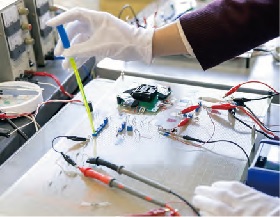
Checking the output current
Creating the story to convey my research findings.
Writing a thesis and giving an academic presentation in English is a chance to grow as a researcher. Naturally, the Q&A is also held in English, so you are required to improvise and think on your feet. Before receiving a final decision on my participation in the international conference, I was allowed to attend the Advanced Scientific English class at Toyo University Graduate School where I had been admitted to go to after undergraduate program. In this class, we learned a lot about practical English required as a researcher, such as how to write a thesis in English and how to write an essay. We also had opportunities to give presentations using slides. Technical terms in English are not so difficult because there is fixed terminology so that no one makes any mistakes. That being said, this was my first time presenting at a conference in English. Professor Sano coached me, and I received a lot of help from my graduate school seniors. Professor Sano constantly reminded me of the importance of making a story when writing a thesis or presenting at conferences. Rather than just listing facts, it is important to think about aspects such as why you did this, how you improved it, what your goal was, what you got from achieving it, and what point you want to get across the most. Professor Sano taught me that selecting what you convey to the audience and creating a story are essential, particularly as presentation time at conferences is strictly limited. On the day of the presentation, I was so nervous that my jaw was shaking, but I was able to deliver my presentation within the time as I practiced and demonstrate the results of my research.
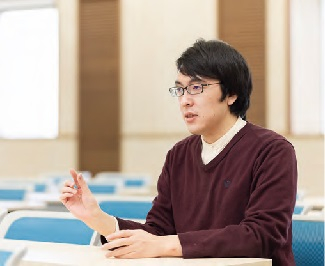
Research takes patient efforts. That is why you become attached to your work.
The conference that I attended was an international conference for Japanese and Taiwanese students. Even on the same topic of circuits, I was inspired by Taiwanese students who gave fascinating research presentations that incorporated popular trends such as digital circuits, different from the analog circuits I am researching.
My day starts with checking emails containing my professor's feedback regarding research outcomes in the previous day. Based on these emails, I think about what I should try next or what simulation I should run, and I spend every day concentrating on my research. When designing circuits on a PC, I repeat the process of compiling minute parts one by one inside one square centimeter. Research is an accumulation of steady work. However, I get a lot of satisfaction when the circuit is completed as it was designed, or when I am able to get data using the circuit as I hypothesized, and I become attached to my research.
I won the Best Student Presentation Award at the international conference, however, I still need to devote myself to my research every day without being satisfied with this success. Aiming at being involved in research and development as a corporate researcher, I will continue to pursue this steady path at my graduate school from April.
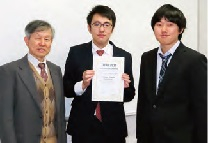
Professor Yuji Sato (left), Naoya Nishiyama, co-researcher and graduate student from the same laboratory office (right)
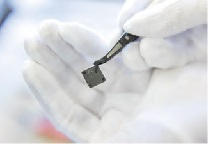 Integrated circuit designed by Matsui |
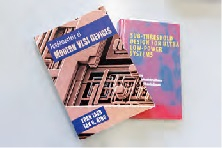 Matsui’s favorite reference book |